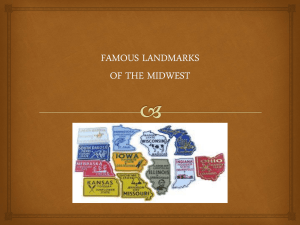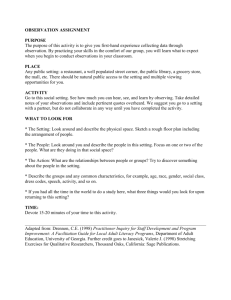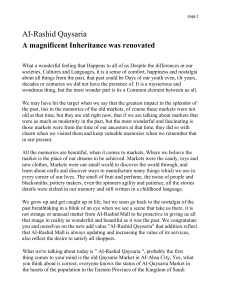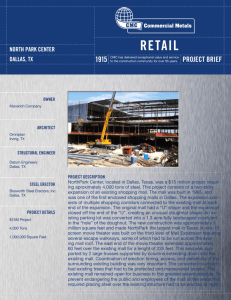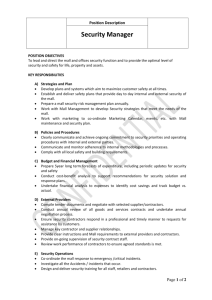second article
advertisement
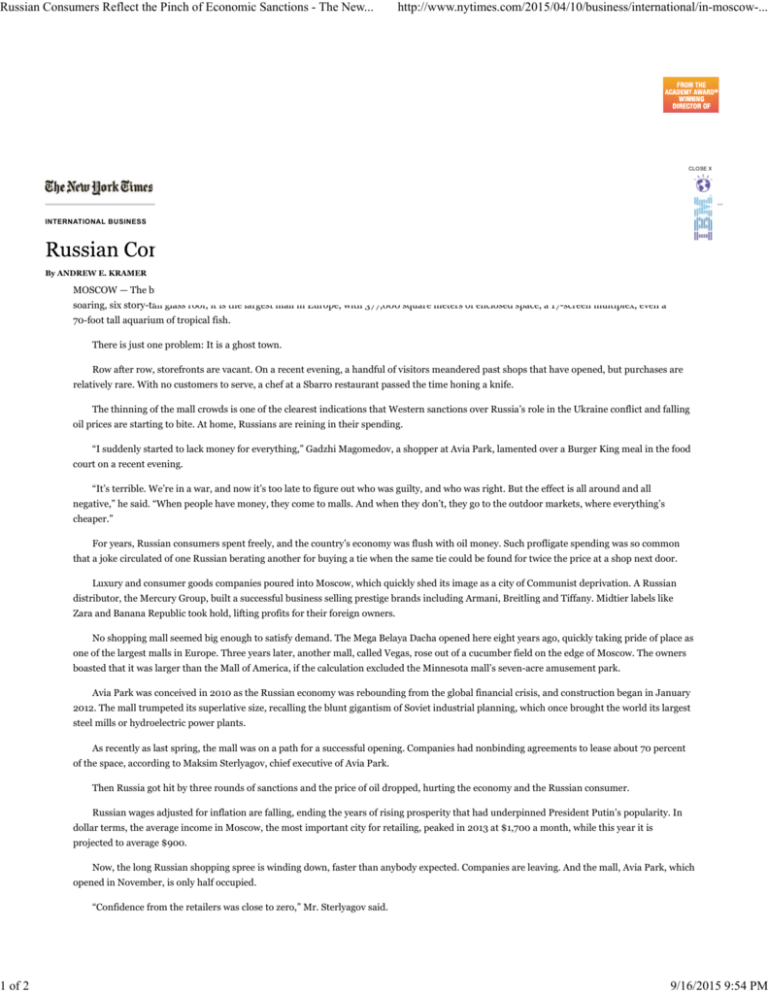
Russian Consumers Reflect the Pinch of Economic Sanctions - The New... 1 of 2 http://www.nytimes.com/2015/04/10/business/international/in-moscow-... CLOSE X INTERNATIONAL BUSINESS By ANDREW E. KRAMER A MOSCOW — The br soaring, six story-tall glass roof, it is the largest mall in Europe, with 377,000 square meters of enclosed space, a 17-screen multiplex, even a 70-foot tall aquarium of tropical fish. There is just one problem: It is a ghost town. Row after row, storefronts are vacant. On a recent evening, a handful of visitors meandered past shops that have opened, but purchases are relatively rare. With no customers to serve, a chef at a Sbarro restaurant passed the time honing a knife. The thinning of the mall crowds is one of the clearest indications that Western sanctions over Russia’s role in the Ukraine conflict and falling oil prices are starting to bite. At home, Russians are reining in their spending. “I suddenly started to lack money for everything,” Gadzhi Magomedov, a shopper at Avia Park, lamented over a Burger King meal in the food court on a recent evening. “It’s terrible. We’re in a war, and now it’s too late to figure out who was guilty, and who was right. But the effect is all around and all negative,” he said. “When people have money, they come to malls. And when they don’t, they go to the outdoor markets, where everything’s cheaper.” For years, Russian consumers spent freely, and the country’s economy was flush with oil money. Such profligate spending was so common that a joke circulated of one Russian berating another for buying a tie when the same tie could be found for twice the price at a shop next door. Luxury and consumer goods companies poured into Moscow, which quickly shed its image as a city of Communist deprivation. A Russian distributor, the Mercury Group, built a successful business selling prestige brands including Armani, Breitling and Tiffany. Midtier labels like Zara and Banana Republic took hold, lifting profits for their foreign owners. No shopping mall seemed big enough to satisfy demand. The Mega Belaya Dacha opened here eight years ago, quickly taking pride of place as one of the largest malls in Europe. Three years later, another mall, called Vegas, rose out of a cucumber field on the edge of Moscow. The owners boasted that it was larger than the Mall of America, if the calculation excluded the Minnesota mall’s seven-acre amusement park. Avia Park was conceived in 2010 as the Russian economy was rebounding from the global financial crisis, and construction began in January 2012. The mall trumpeted its superlative size, recalling the blunt gigantism of Soviet industrial planning, which once brought the world its largest steel mills or hydroelectric power plants. As recently as last spring, the mall was on a path for a successful opening. Companies had nonbinding agreements to lease about 70 percent of the space, according to Maksim Sterlyagov, chief executive of Avia Park. Then Russia got hit by three rounds of sanctions and the price of oil dropped, hurting the economy and the Russian consumer. Russian wages adjusted for inflation are falling, ending the years of rising prosperity that had underpinned President Putin’s popularity. In dollar terms, the average income in Moscow, the most important city for retailing, peaked in 2013 at $1,700 a month, while this year it is projected to average $900. Now, the long Russian shopping spree is winding down, faster than anybody expected. Companies are leaving. And the mall, Avia Park, which opened in November, is only half occupied. “Confidence from the retailers was close to zero,” Mr. Sterlyagov said. 9/16/2015 9:54 PM Russian Consumers Reflect the Pinch of Economic Sanctions - The New... 2 of 2 http://www.nytimes.com/2015/04/10/business/international/in-moscow-... Zinaida Ivanova, a retiree browsing in M.Video, an electronics store, blamed American sanctions for the mall’s troubles — and more. “America is an international bandit,” she said. “Poor Putin is pushing back the best he can.” Consumer goods companies, whose executives once saw the emerging post-Soviet middle class as an opportunity on par with China, Brazil and India, have broadly been re-evaluating the prospects in Russia. This year, Zara, the Spanish fast fashion brand, closed its flagship store on Tverskaya Street. Zara’s parent company, Inditex, which also owns Massimo Dutti, Pull and Bear and other labels, said it would halt Russian expansion. Gap closed a large outlet in the Atrium mall. Wendy’s, the hamburger chain, Esprit, the clothing brand, and River Island, a British fashion shop, are all winding down operations in Russia. Adidas, the German shoe company, announced a restructuring that will close dozens of stores, though one did open in Avia Park. Over all, about one in 10 storefronts are vacant on Moscow’s main shopping streets, according to a research note by Jones Lang LaSalle, a commercial real estate consultancy. Retail sales in Russia fell 7.7 percent in February compared with a year earlier. “Financially, they really have to throw out the business plan,” Darrell Stanaford, a consultant with the Romanov Dvor shopping center in Moscow, said of Moscow’s more than 80 malls, which have names like Mega and Metropolis. With the Russian economy slipping, managers at Avia Park say they are retooling, trying to draw in visitors who don’t want to shop. Increasingly, they are emphasizing the low-cost family entertainment possibilities like the ice rink and restaurants. KidZania, a Mexican company, is developing a play area, where children can role-play in jobs like a delivery man or airline pilot and earn wages in a pretend currency. The mall’s centerpiece, the four story-tall, saltwater fish tank, has become part of the strategy, too. The management retained an ichthyologist, a biologist who studies fish, to improve the economics of its operation. Some tropical fish had cost as much as $5,000 per specimen, Mr. Sterlyagov said. The specialist advised the mall to buy fish of the same size, and let them grow together, lest the larger ones eat the smaller ones. Of the few visitors in the mall, all paused to gaze up at this wonder, where schools of yellow-and-black striped fish, pink fish, rainbow fish, all of about the same size, twirled in an endless and mesmerizing spiral. It seemed a world apart from the dirty slush and deepening glum of evening outside. “If the overall political situation stabilizes, consumer confidence will come back,” Mr. Sterlyagov said. For now, though, “our economic model turned out different from reality.” Anastasia Romadankeno, a saleswoman at a Crocs shoe store in the mall, expressed more optimism, noting that the shopping center had just opened. “People will come,” she said, in an empty store. “People want to eat and need clothes, so they will come.” Correction: April 25, 2015 An article on April 10 about Russians’ reining in their spending misstated the size of the Avia Park mall in Moscow. It is 377,000 square meters, not square feet. (It is 4.1 million square feet.) The error was repeated in an accompanying picture caption. The article, using information posted at the shopping center, also misstated the status of H&M and American Eagle Outfitters stores at the mall. The H&M store will open at a later date, but American Eagle Outfitters does not plan to open at the mall; the stores are not open now. The article also referred imprecisely to the Adidas store at the mall. While the Adidas Kids store is open, the main Adidas store is not yet open. And the article, using information from the mall management, referred incorrectly to the ownership of a company that invests in the mall. The company is owned by Igor Rotenberg — not by his father, Arkady Rotenberg. A version of this article appears in print on April 10, 2015, on page B1 of the New York edition with the headline: Pinching Their Rubles. © 2015 The New York Times Company 9/16/2015 9:54 PM


